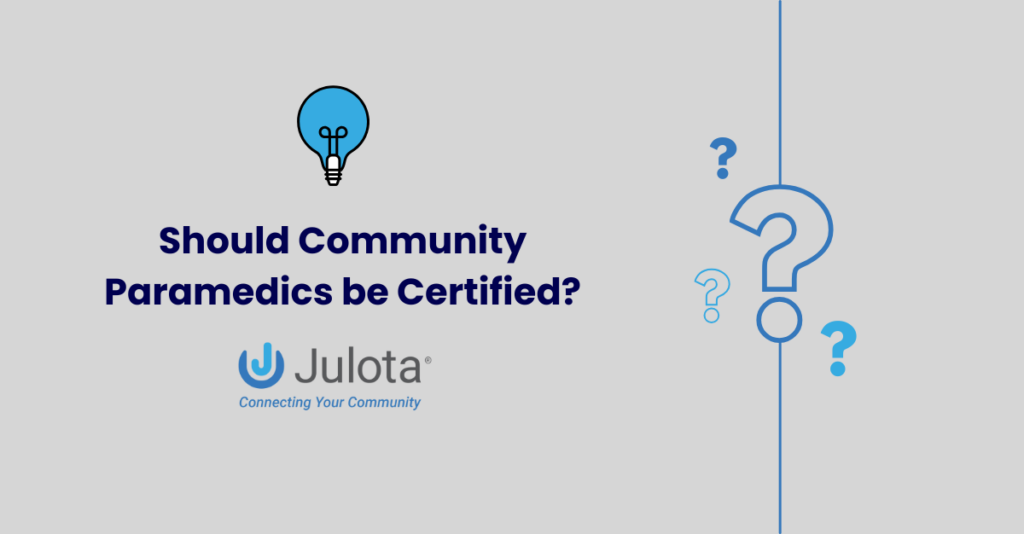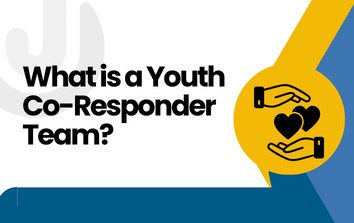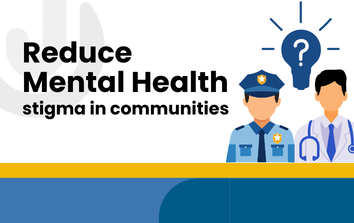Should community paramedics be certified? While it may seem simple, this topic is deceptively complex. In asking the first question, several others come up: Should community paramedics be specially certified? Can providers like EMTs or Firefighters work in community paramedicine? Should certification be required?
Community paramedics should be certified to local, state, and national standards; however, not all areas require special certification. Licensed paramedics can perform community paramedicine tasks that fall within their current scope of practice. However, if the community paramedic is asked to perform extended tasks, they should receive authorized training.
While there are detractors, many argue that moving to a universal certification system will benefit the profession. Let’s examine all these points in a little more detail. We’ll discuss the pros, the cons, and the nuances.

MIH-CP Accreditation: Do Community Paramedics Need to Be Certified?
There are regular “paramedics” and then “community paramedics.” In many cases, community paramedics do not need to be certified as such. Let me clarify: community paramedics still need to be certified at a basic medical level (whether that’s a paramedic, nurse, or EMT, depending on the area).
Yet, this leaves the question (and an important distinction): should community paramedics be certified specifically as community paramedics? To answer this, we need to dig a little deeper.
Here are the questions that we need to answer:
- Who certifies community paramedics?
- How does a community paramedic become certified?
- Why should a community paramedic be certified?
- Why shouldn’t a community paramedic be certified?
Now, let’s take each of these points and read the fine print. As you’ll see, I try to provide both sides of the story. While your initial thought might be, “Of course, community paramedics should be certified,” you’ll see that there are reasons many people push back on that idea (whether they are good reasons or not, I’ll leave you to judge).
If you’re curious, read our article: Can EMTs work in community paramedicine?
Who Certifies Community Paramedics?
Community paramedics are certified in three main ways: a national CP certification, a local certification, and their current certification.
First, the most widely recognized way for a community paramedic to be certified is through the International Board of Specialty Certifications. The IBSC is the same organization that provides certifications for Wilderness Paramedics, Tactical Paramedics, and Critical Care Paramedics.
The second way community paramedics are “certified” is through local training. This might be training put on by the medical director that authorizes the paramedic to work as a community paramedic in that area. As expected, these local processes vary widely by area, and community paramedics are usually trained based on a specific need.
Finally, many areas rely on a paramedic’s original licensure and certification. Paramedics are already trained in a broad range of skills that suit them for many community paramedicine tasks. This method is often merged with local training; however, there are instances where paramedics receive no additional training for community paramedic-related work.
As you can see, there are many methods for training community paramedics. Before we move on, let’s discuss the process many community paramedics take to become certified by the IBSC.
How Does a Community Paramedic Become Certified?
We’ve already mentioned that the IBSC provides the most widely recognized community paramedic certification; however, how do community paramedics achieve this certification?
Currently, the NAEMT offers a nationally recognized class for community paramedics. This class explicitly states that it is designed to prepare paramedics for the IBSC exam, but that’s not the end of the story.
First, a paramedic does not need to take this class to sit for the IBSC community paramedic certification. This means that if a paramedic wants to, they can sign up for the IBSC exam without additional training.
Second, while the NAEMT community paramedic course states that its program is for “those certified at the paramedic level or higher,” the IBSC certification is not exclusive to paramedics—for example, EMTs can sit for the IBSC certification and become community “paramedic” certified.
After breaking all this down, you can see that being a “certified community paramedic” does not mean the same thing as being a “certified paramedic.”
A paramedic must complete an approved training program before sitting for the National Registry of Emergency Medical Technicians (NREMT) exam, which is only available to those who have completed approved training (for example, a nurse cannot decide to sit for the paramedic exam without at least an EMT certificate and proven emergency experience).
What does all this add up to? Simply this: the processes to train, certify, and license paramedics are standardized and nationally recognized. The processes to train, certify, and license community paramedics are not standardized and nationally recognized – but should they be? Some people say yes, and some say no.
Why Shouldn’t a Community Paramedic be Required to Become Certified?
First, let’s talk about why people say that community paramedics should not be required to achieve additional certification as community paramedics. While this may seem like an extreme position, there are some honest reasons for the pushback.
After discussing the “negatives” of community paramedic certification, we’ll discuss why many favor a unified system.
Why some argue community paramedics shouldn’t be required to obtain certification:
- They already are “certified”: The first argument is that paramedics are already well-trained for the job, many with over 2000 hours of education in many environments. The feeling is that paramedics already know enough to get the job done, and any other skills can be learned without violating the paramedic’s scope of practice.
- The increase in costs: The second reason that some people would rather not be compelled to certify their community paramedics is the increase in cost. In many cases, companies will need to pay for their paramedics to receive this extra training. These costs include classes, examination fees, and approved clinical time—not to mention fees for instructors, learning materials, etc.
- The barrier of entry: Many areas are already struggling to staff their ambulances, and the idea of requiring more training seems counterintuitive, and like another wall, they need to climb.
Remember that these arguments are only those commonly found – they are not the personal opinion of this author. Now, let’s look at why a community paramedic should be certified.
Why Should a Community Paramedic be Certified?
While there are some detractors (as we saw in the last section), many advocate that community paramedics should be certified, let’s discuss some of the arguments for certification, and then you can make up your own mind.
Here are some reasons that community paramedics should be certified:
- Non-certified health professionals are unprecedented (particularly in a specialty): Many argue that all health professionals must be certified to some extent – from CNAs to MDs, certification is the standard, particularly in a specialized environment like community paramedicine.
- Nationally recognized certification increases the chance for growth: Certification is a base-level proof of competency. However, certification does more than just ensure a provider knows their skills; it acts like a “brand name” for a professional. Everyone likes to buy from and work with organizations with a good brand, tested, respected, and can be held accountable for their mistakes. Certifying community paramedics builds trust, and trust leads to growth.
- Certifying community paramedics can improve recruitment: Some people see education as a wall, and others see it as a door. When community paramedics are required to be certified, providers often want to further their careers and earn better pay. Also, certification blazes the trail to offering community paramedic classes in more colleges around the country, which will, in turn, attract more future health professionals.
- A pathway to great reimbursement: Many states are fighting to allow community paramedicine to bill for its services. If community paramedics are certified, it makes it easier for areas to argue that the services they provide are needed, repeatable, and worthy of reimbursement.
As you can see, community paramedics should be certified for many reasons. Now that you’ve seen both sides of the equation let’s summarize.
The Importance of Certification and National Unity in Community Paramedicine
The question of community paramedic certification is oddly unclear. Depending on where you live, community paramedics may or may not be required to achieve special certification. Some argue that certification isn’t necessary, is too costly, and will create a barrier.
Others argue that certification for community paramedics will lead to greater trust in the profession, more opportunities for reimbursement, and increased recruitment in the long run. A recognized certification acts as a profession’s brand, and a good brand can go a long way toward building an organization. And one thing is sure: without some level of national unity, it will be difficult for community paramedicine to march forward.
Contact Julota to learn how their cloud-based software platform can help build, run, and sustain your community paramedicine program.




